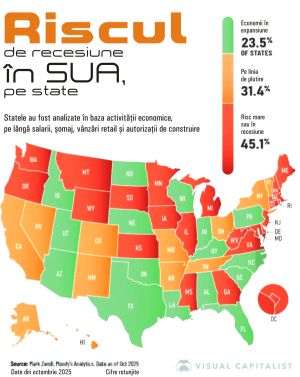An economic crisis is like a muscle cramp - it comes and goes. It does so quicker or faster, depending on how quick the reaction is.
A recession however is worse, it can last a year or two.
The worst thing however, is the economic depression, which some define as "a phase of the economic cycle which follows the crisis and precedes the economic revival".
Which, even though it inexcusably simplifies the process, can allow one to understand that the depression represents the most severe contraction of the economy.
In a study supported by the official numbers, economics doctor Daniel Ionescu says that we are not in a crisis, nor in a recession, but rather in an economic depression.
When asked how long the latter tends to last, Daniel Ionescu estimated that Romania"s economic depression could last seven to ten years, depending on the measures taken to counteract it.
We hereinafter publish the study drawn up by Daniel Ionescu - a comprehensive material, padded with statistics and numbers, highly conceptualized, a text which is usually intended for economics and finance experts.
The study includes four sections which operate together, but can also be read separately, as four independent articles:
• 1."Huge sacrifices, insufficient benefits"
This article mathematically proves, that cutting 25% off wages and 15% off unemployment aids and pensions will lead to only 0.9 billion Euros in savings.
On a slightly sarcastic tone, in an attempt to highlight the absurdity of the aforementioned measures, the author calculated that in order to balance the budget, the government should have cut 45% off pensions and unemployment aids and 75% off the wages of public sector workers.
• 2. "The manipulation of the budget deficit"
In his article, Daniel Ionescu includes the columns of numbers that led to the discrepancy that was noticed by the officials of the IMF, on their last evaluation of the Romanian economy.
The author claims that the deficit of 5.9% of the GDP, was a result of the manipulation of various figures, which were moved around between incompatible budgets, covering the deficits with the surpluses of other public institutions which are self-financing, (which keep their funds, and as a result should not be included into the Consolidated budget because they don"t belong in it).
• 3. "Twenty years in a wrong direction"
Unlike the first 14 years after 1990, when the number of pensioners had been continuously growing, from 3.3 million, to 6.2 million in 2004, over the last six years their numbers have been dropping by about 175,000 a year, until 2008. The number increased abruptly in 2009, through the disappearance of 265,000 pensioners.
Did they get hired?
No. They died.
The effect of the hiking of the retirement age from 62 to 65 will only be felt starting in 2011.
The disappearance of the 265,000 pensioners, is the result of the economic troubles.
It gives weight to the censure motion which is scheduled to be voted tomorrow in the Parliament: "Stop the social genocide!"
Most likely the text of the motion was written by Adrian Năstase, who may have given it this title out of too much enthusiasm, ignoring these numbers concerning the pensioners.
An no matter how much Năstase may have tarnished his image as politician and prime-minister, even if he is not aware of the fact that pensioners are dropping like flies, his title is valid: we are dealing with a genocide.
In his study, Daniel Ionescu also proves that every employee in the real economy has to support three other employees - regardless of whether they are paid from the budget, or whether they are collecting pension or unemployment aid.
• 4. "Alternative measures compared to those proposed by the Government"
Daniel Ionescu proposes a package of measures which sound rather disconcerting given the current worsening economic circumstances. When everyone was suggesting that the choice lied between cutting wages and pensions and raising profit taxes and VAT, Daniel Ionescu proposes exiting the crisis by eliminating the profit tax and cutting VAT and leaving the wages unchanged!
Read the article, if only to see an alternative to the Government"s solutions "at work".
The comprehensiveness of the study published by Daniel Ionescu has caused us to dedicate this entire issue of BURSA to it.
Some of you may wonder, did we dedicate this issue to Daniel Ionescu?
No.
It id dedicated to you, our readers.
Because, being businessmen, and being used to having to deal with difficult circumstances you will be able to handle this elaborate text.
And regardless of whether you are going to read it with a pencil in your hand or just skim through it, you will get something out of it.























































